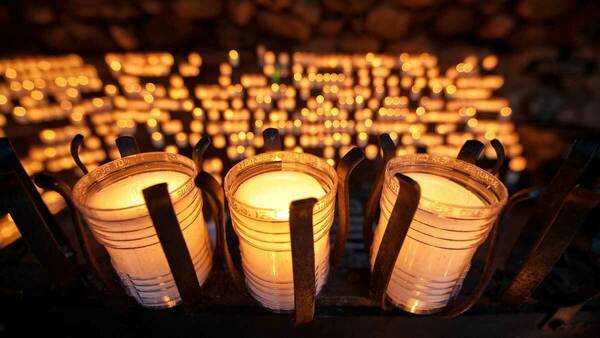In memoriam: Charles Kulpa, professor emeritus of biological sciences

Charles “Chuck” Frank Kulpa Jr., professor emeritus in the Department of Biological Sciences, died April 30 in South Bend. He was 80.
Kulpa was a respected scholar and professor of environmental and applied microbiology for 40 years. He studied the metabolism of microbes, including bacteria, and investigated topics including their ability to degrade toxic pollutants in the environment.
“Chuck used a novel combination of molecular, biochemical and cellular approaches to determine how microbes detoxified these pollutants, and he was among the first microbiologists to embrace the new field of ‘biotechnology’ that is now so fundamental to science,” said Professor Gary Lamberti, whose office was next to Kulpa’s in Galvin Life Science Center.
A triple graduate of the University of Michigan (with bachelor’s, master’s and doctoral degrees) and avid Wolverine football fan, Kulpa began working as a professor at the University of Notre Dame in 1972 and retired in 2012.
“He was an experimentalist. He enjoyed talking about the details of all sorts of lab procedures and was curious about everything in the science news and enjoyed discussing current topics with colleagues,” said Professor Joseph O’Tousa. “This was key to how he approached his course and lab teaching assignments.
“Yet he would also want to talk to me about family news and other things going on outside of work. His friendship provided an important perspective for me in balancing these life activities. I imagine his students benefited from this as well.”
Intellectually curious, Kulpa frequently took advantage of novel opportunities. For instance, when Kulpa studied how to remediate polluted areas by “seeding” them with microbes, he speculated that he would not find suitable microbes in the Midwest because much of the soil has been polluted by industry.
When Lamberti mentioned that he was traveling to Alaska for some research, Kulpa had an idea.
“One day he asked me, ‘Gary, can you bring me some dirt from Alaska?’” Lamberti said. “He explained that he needed the dirt to search for bacteria that he can culture because Alaska has low pollution.
“Dutifully, I brought him back vials of soil from remote areas of Alaska, and he was thrilled to find some new microbes to test in his lab.”
At the same time, Kulpa was down to earth and, when he was department chair, he allowed students to throw pies in his face for a fundraiser, Lamberti shared. “I think Chuck enjoyed it more than the students.”
According to Kulpa’s obituary, he was an avid golfer and played on the green of St. Andrew’s in Scotland, an experience that held deep meaning for him. He also enjoyed traveling and sharing his travel stories with all who would listen. Kulpa is survived by his wife, four children, 18 grandchildren, a great-grandchild, a brother and a sister.
“He cherished his family,” O’Tousa said. “ He was beaming whenever he talked of the many times he and Loretta and their farm would be the destination spot for a summer week with their grandkids or their treks to the east coast to visit their grandchildren.”
Visitation will be from 12 to 2 p.m. Saturday (May 11) at Brown Funeral Home, 521 E. Main Street, Niles.
Latest Faculty & Staff
- Faculty receive prestigious early career awards from National Science FoundationDuring the 2024-25 academic year, four researchers in the University of Notre Dame’s Colleges of Engineering and Science received early-career awards from the National Science Foundation.
- In new research, Roy Scranton explores climate change and the limits of human progressIn his most recent book, “Impasse: Climate Change and the Limits of Progress,” Scranton, an associate professor of English, defines the impasse he sees as “not only political and institutional, but cognitive, existential and narrative” and asserts that the only path forward is through embracing what he terms ethical pessimism. “A lot of people confuse pessimism with nihilism, apathy and despair,” Scranton said. “But pessimism is actually about recognizing our limits, letting go of unrealistic goals, finding solidarity in the fact of human suffering and doing what you can now, not in some utopian future.
- Joule Bergerson, energy technology assessment expert, named new director of ND EnergyND Energy faculty director Joule…
- In memoriam: Alasdair MacIntyre, the Rev. John A. O’Brien senior research professor of philosophy emeritusAlasdair MacIntyre, the Rev. John A. O’Brien senior research professor of philosophy emeritus and a permanent senior distinguished research fellow at the de Nicola Center for Ethics and Culture, died on May 21, 2025. He was 96.
- Santiago Schnell, dean of Notre Dame’s College of Science, appointed as provost of DartmouthSantiago Schnell, the William K. Warren Foundation Dean of the College of Science at the University of Notre Dame, has accepted an appointment as provost at Dartmouth College. He will depart Notre Dame at the end of June and begin his new role in July.
- Notre Dame’s Fightin’ Irish Battalion receives Department of Defense award as nation’s top Army ROTC programThe United States Department of Defense honored the University of Notre Dame’s Army ROTC Fightin’ Irish Battalion as the nation’s top Army collegiate program for the 2023-24 academic year. This will be the first time the unit has received the department’s Educational Institution Partnership Excellence Award, which recognizes the program’s achievements in recruiting, educating, training and commissioning leaders of character to be the next generation of military officers.












